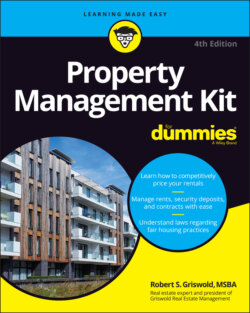Читать книгу Property Management Kit For Dummies - Robert S. Griswold - Страница 61
Structuring compensation
ОглавлениеYour management company’s compensation can be affected by more than just the standard considerations mentioned in the preceding section. Knowing how to look beyond the basics can save you money in the long run and make your management company work for you and your investment.
Make sure that your property manager is compensated in a way that incentivizes or motivates them to keep your rental property occupied by a stable, long-term tenant who treats your rental property as their home, respects their neighbors, and pays a market rent in a timely manner. Structure the compensation so that the management company has an incentive to get the property leased up (all vacant units filled) as soon as possible. When you’re analyzing your property manager’s compensation fees, keep these tidbits in mind:
Watch out for management fees that seem to be too low. The adages “You get what you pay for” and “If it’s too good to be true, it probably is” come to mind. Management fees that seem to be too low are a good indication that the property managers are spread too thin and may not manage your property properly. Poor management can result in unhappy tenants, which leads to higher turnover and longer periods of vacancy without rental income.
Understand that leasing fees are often justified and usually not negotiated. The most time-intensive portion of property management is tenant turnover. When one tenant leaves, the property manager must make the unit rent-ready; then they must advertise, field multiple inquiries, show the property, and screen the prospective tenants. Leasing fees may vary, but you can usually expect either a flat fee of several hundred dollars or a percentage of the rent, such as half or all of the monthly rental amount.
